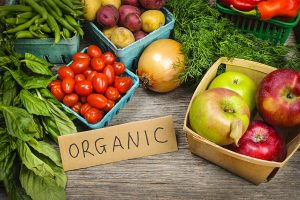Organic Foods: Are they Worth the Money?
 When folks think about the term “organic” they often think about healthy, nutrient-rich organic foods, which is the focus of this article. We at Natural GREEN Lawns, or course, also think about natural, organically-based lawns because there are plenty of correlations between the two. For now, however, let’s focus on organic foods.
When folks think about the term “organic” they often think about healthy, nutrient-rich organic foods, which is the focus of this article. We at Natural GREEN Lawns, or course, also think about natural, organically-based lawns because there are plenty of correlations between the two. For now, however, let’s focus on organic foods.
What does “organic” really mean?
It refers to how a plant was grown and processed. In regards to food it means that the food has to have been grown and processed without the use of synthetic chemicals and chemical preservatives, has to be GMO-free, irradiation-free, and was not grown with the use of petroleum or sewage-based fertilizers. From a food standpoint, there are a lot of benefits of replacing “conventional” mass-produced food with organic alternatives. First, organic foods contain less residual pesticides than the non-organic foods you and your family eat. Equally important, organic foods are as much as 50% higher in certain nutrients, and do not contain residual antibiotics or growth hormones often found in meats.
Organic food production benefits the environment.
Organic farming significantly reduces and often eliminates underground water contamination. It does this because organic farm soil is softer and spongier due to its higher content of organic matter and microbial activity, and thus retains water better and reduces runoff. Synthetically-treated farm soil is harder and compacted, thus significantly increasing chemical runoff. Organic farms also reduce the need for harsh chemical pesticides because organic soil naturally deters unwanted pests and attracts the wildlife that helps control those pests. The same environmental benefits are achieved with an organic lawn.
Is it worth transitioning to organic foods?
The cost of organic foods, unfortunately, is typically higher than the cost of foods grown with synthetic chemical fertilizers and pesticides. If you are considering transitioning to organic foods, there are certain ones where the cost is easily justified because of the lower content of residual pesticides. Here is a list of several common foods (and there are plenty more) that should be purchased as organic: Apples, cherries, cucumbers, celery, grapes, lettuce, peppers, potatoes, spinach, strawberries, and tomatoes. Common foods that are typically lower in residual pesticides (because they are hardier and thus require less pesticides) and thus can be purchased from conventional farms include asparagus, avocados, cantaloupes, corn, eggplant, grapefruits, kiwis, onions, and pineapples, along with several others.
Who should switch to organic foods?
 Everyone should, but it’s not always in the budget. Those most vulnerable to the harmful effects of synthetic pesticides are children who, according to several studies, have been found to have a higher percentage of pesticides in their bodies. Another vulnerable group are pregnant women since (1) they pass everything on to their unborn child, and (2) these chemicals stress their already-taxed organs. For a few dollars per week more, it is well worth replacing some chemically treated foods with organic foods. Oh, by the way, they also taste better!
Everyone should, but it’s not always in the budget. Those most vulnerable to the harmful effects of synthetic pesticides are children who, according to several studies, have been found to have a higher percentage of pesticides in their bodies. Another vulnerable group are pregnant women since (1) they pass everything on to their unborn child, and (2) these chemicals stress their already-taxed organs. For a few dollars per week more, it is well worth replacing some chemically treated foods with organic foods. Oh, by the way, they also taste better!
How does this translate to having an organic lawn?
For all the same reasons mentioned above, what is good for an organic farm, and the food you eat, is also good for your lawn. Remember, your lawn is where your children play, and it’s the grass that your pets roll around in. It’s the grass that your pets (unfortunately) try to eat when you’re not looking, and it’s the soil and grass that often gets caught in your shoes and thus often ends up in your house.
Natural GREEN Lawns: We’re your local, organic-based lawn care company, and your alternative to dangerous synthetic chemical fertilizer companies.